Unless you live under a rock (I can say that because I’ve been known to camp out under a pebble or two), there’s no doubt that you’ve been hearing about one thing in the news lately:
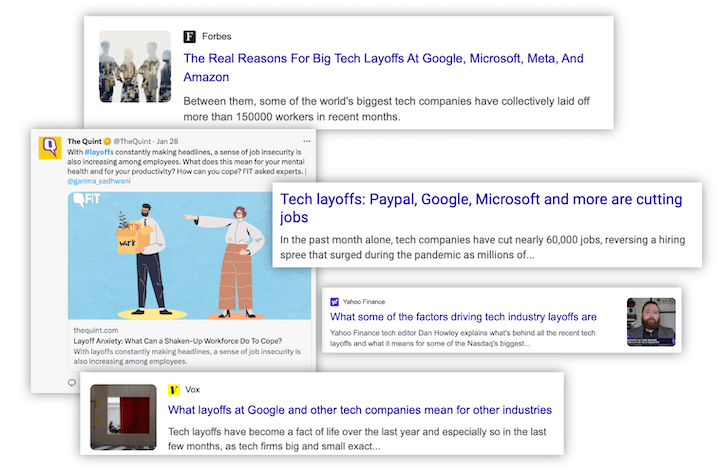
Big Tech layoffs.
Microsoft, Google, Amazon.
It even has its own hashtag #layoffs2023.
Mass layoffs of any kind are unsettling no matter how applicable they are to you, but as a small business owner or marketer, you may have some concerns. Yes, this is “Big” Tech, but does this or will this have any implications for small businesses? Many of these companies are also ad platforms, so will this have any impact on PPC?
I’ve taken a dive into the story from this angle to provide you with some key takeaways. Read on to learn:
- What’s happening in Big Tech?
- Why are all these layoffs happening?
- What does it mean for online advertising and small businesses?
What’s happening in Big Tech?
In January of 2023 we saw more layoffs in the Big Tech sector than in any month since the pandemic. To put things in perspective, there were 159,684 tech job cuts in 2022, but in January of 2023 alone, we saw 68,502. That’s more than 43% of what we saw in all of last year.
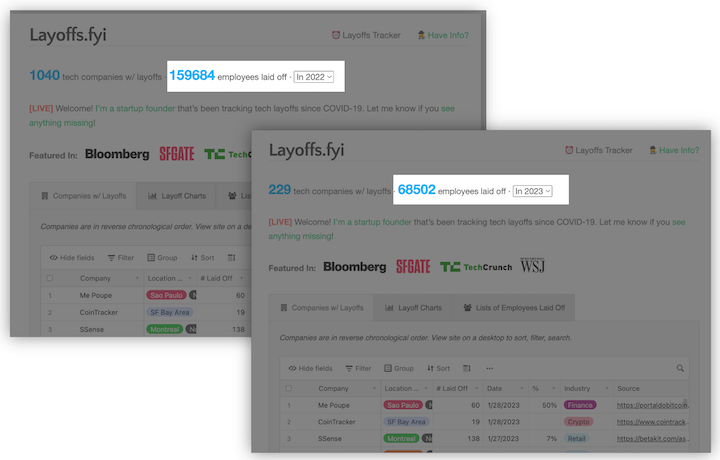
Companies that have conducted mass layoffs in January and recent months include Google, Microsoft, Informatica Salesforce, Amazon, SAP, IBM, Spotify, Wayfair, Coinbase, and Vox Media.
As mentioned earlier, mass layoffs innately are concerning, but the reason why this situation is of particular interest is that not only is it unexpected, but it’s also being called one of the worst contractions in the industry’s history.
And it’s also a little peculiar when you look at it in relation to the labor market. As The Atlantic writer Derek Thompson points out:
- During the 2010s, the labor market was weak but the tech sector was growing.
- During the pandemic, the economy had a “flash freeze depression” while tech took off.
- Today, the labor market is strong but tech is “bleeding.”
So what’s going on here?
Why are all these layoffs happening?
There are multiple factors at play, which Derek’s article does a great job covering. Here’s the rundown:
The expected tech “acceleration” from the pandemic turned out to really just be a “bubble.”
Tech companies, consumers, and investors alike all subscribed to the notion that the surge in remote work, ecommerce, and other online platforms during the pandemic put us on the fast track to the 2030s. But this has not been the case. We never made it there; we’re still just on our way and we’re settling back into the same speed of travel as in 2019. As a result, all of that expansion and investing now is in excess. Hence the contraction.
Inflation caused an advertising slump
Keep in mind that many of these tech companies—Google, Meta, Amazon, etc.— are also advertising platforms. And with inflation reaching its highest levels in 40 years in 2022, many businesses pulled back on advertising as this is often one of the first areas to see cuts during a shaky economy—not to mention the fact that advertising costs increased along with everything else.
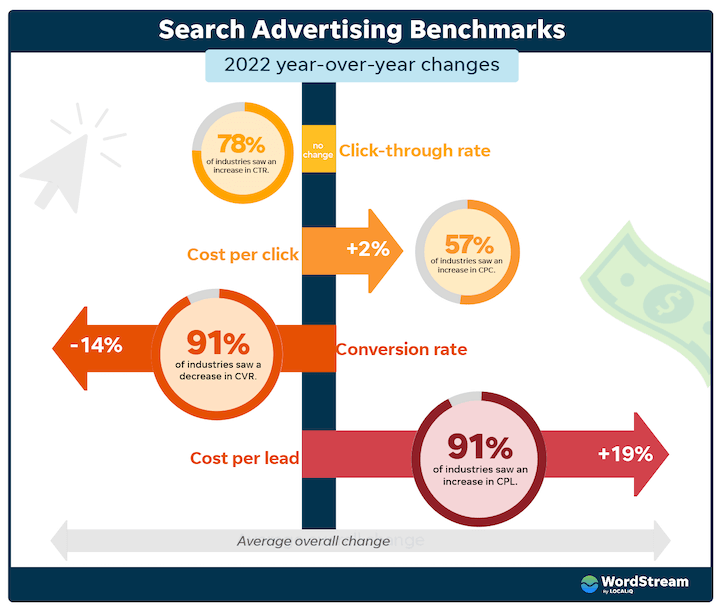
Companies are preparing and adjusting
For some companies, the layoffs are happening also as a proactive measure. While inflation appears to be on the mend (it has dropped from 9% to 6.5%), economists, and therefore businesses and consumers are still wary of a recession. If these companies want to maintain profitability and to send the right message to shareholders, they need to prepare for businesses and consumers to continue cutting back on spend even in the new year—which means cutting back on spending themselves.
Of course there are spinoff theories and schools of thought, but these are the core reasons you’ll find woven throughout any coverage on the matter.
What does it mean for small businesses and PPC?
Alright, so now that you have a grasp on what’s happening and why, let’s talk about what this means for small businesses and PPC according to news articles, last week’s PPC chat discussion, and the very PPC experts who contribute to our blog! Here are some key takeaways that feel particularly pertinent:
1. Big tech is not at risk
“Revenue decline” doesn’t necessarily mean that any of these businesses are failing or on their way out. Remember, these aren’t just businesses, they are behemoths. And as Tech Reporter Bobby Allyn’s NPR article cited earlier states, while these changes are historic, they’re still small on a percentage basis.
These companies are still massively wealthy and Big Tech has been on a strong growth trajectory for the past ten years. Microsoft alone made $198 billion in revenue in 2022.
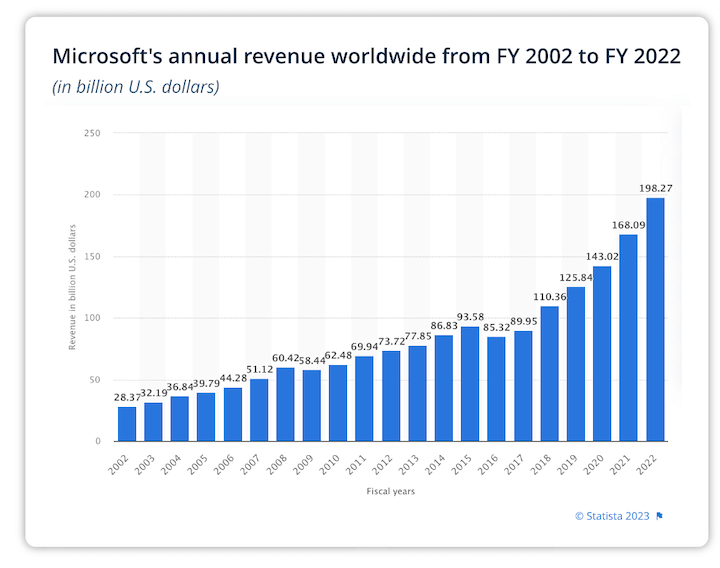
These measures aren’t a sign that they’re on the brink of disappearance, but rather course correction in accordance with the post-pandemic story as it unfolds, to get back on that growth trajectory.
2. This is only temporary; digital advertising will still grow
Given the above, it’s not surprising that many PPCers feel this is only temporary and aren’t concerned about there being a further economic downturn or ripple effect on small businesses or advertising in general.
Take digital marketing strategist, author, and speaker Anders Hjorth’s Tweet in #PPCChat, for example:
A1: We have been on a shaky ride since Covid. I think the big platforms got overoptimistic and wanted to come out top on the talent battle.
We are now going through a readjustment but it doesn't change the baseline for growth in digital advertising.
This is temporary#ppcchat— Anders Hjorth (@soanders) January 24, 2023
We also asked Brett McHale, founder of Empiric Marketing, LLC and regular WordStream contributor for his take on the matter and he shared the same sentiment:
“We have seen economic downturns and mass layoff lead to eventual booms/bubbles—what comes to mind is the 2008 economic crisis that eventually gave way to the tech boom of the 2010s. I’m not necessarily saying that is what is going to happen now, just that these economic situations tend to have a cyclical nature to them.”
It’s worth noting also that no one expressed concerns about any one platform in particular other than Twitter, for obvious reasons.
3. It could open up new opportunities
Another perspective that many PPC influencers and practitioners share is that with so many talented people out of work and with time on their hands, there is potential for new opportunities or movements to happen. Paid search manager Sarah Steman Tweeted in #PPCChat:
A1: Yes, tech is full of opportunity and when you have this volume of highly qualified people out of work there is a shift, however I also see job loss as opportunity for creation and new ideas sometimes people feel free to explore passions or start a business. #ppcchat
— Sarah Stemen (@runnerkik) January 24, 2023
Mark Irvine, Director of Paid Media at Search Lab Digital and regular WordStream contributor (and former Streamer!), shared this viewpoint:
“The biggest piece to think of is that there are tens of thousands of people with top-quality talent reentering the industry who have years of experience working with large numbers of clients and varied budgets. They’re also well-versed in their former company’s tools and features and have unique insight into the industry from their past roles that many of us don’t have exposure to.”
4. We may see more small consultancies open up
Brett also sees new opportunities arising, more small consultancies in particular:
“I can see many talented professionals in the space making the transition from big brands to independent contract work. Taking on a W2 employee is a massive risk for a company whereas a 1099 employee is a much lower risk, both financially and legally. Talented folks who have lost their jobs might source their talent to multiple companies to create several sources of income for themselves and handle their own health benefits under their own LLCs. “
Navah Hopkins, Brand Evangelist at Optmyzr, regular WordStream contributor (and also former Streamer!) Navah Hopkins expressed the same:
“On a personal note, I often questioned whether I made a mistake not going for one of the big brands. When the layoffs happened, it cemented for me and many other digital marketers like me that we can thrive without “big brand safety.” I’m excited to see the rise of consultants and taking lessons learned to verticals that didn’t have access to the amazing talent now on the market.”
5. Agencies and large resellers have the most to gain
Another outcome we may see, Mark pointed out, is an influx of new talent to agencies and resellers. Here’s what he had to say:
“Agencies and large resellers likely have the most to gain from this shuffle. Compared to small businesses, they’re in the best position to attract this new talent that has experience working across a large portfolio of clients. Additionally, Google’s most recent announcement is that of reembracing its partners, specifically resellers to enable more advertisers to grow on their platforms.”
Resellers mentioned in the article include Accenture, Interactive, Incubeta, Jellyfish, and Media.Monks.
6. Advertisers need to be on guard
One potential concern that many PPCers agreed on was that with revenue in greater focus, ad platforms may start pushing features and upsells more so than genuinely helping advertisers succeed. This wouldn’t be a novel concept by any means (Google Ads automation anyone?), but it will be important to be extra vigilant, especially if you’re a beginner advertiser.
PPC influencer Robert Brady expresses this concern in his Tweet:
A1: The layoffs suck for the people involved. Hard stop.
I also don't like how it signals from the platforms that they're focusing more on the bottom line. There area lot of levers they can pull in their algos to generate revenue at advertisers' expense. #ppcchat
— Robert Brady (@robert_brady) January 24, 2023
He also followed that up with:
And I feel like reps will be even more insistent on pushing features that help the platform and not advertisers. @robert_brady
Mark shared the same viewpoint:
“I’m going to be increasingly skeptical of new products released over the next ~120 days. Layoff rounds right before an earnings call is not coincidental. Product announcements aren’t coincidental either. There’s still lots of great teams at these companies that are making great things, but following a round of layoffs, a product manager isn’t going to boldly recommend that they push back their new anticipated tool for another quarter or two because it’s not ready. Implicit or not, many teams will feel the pressure to produce “quickly now” rather than “correctly later.” I would be extra skeptical of anything announced or anticipated before big days for their investors in April or July. Looking at you, GA4.”
7. Be prepared for outages and/or gaps in support
Another concern is that we could see a degradation in customer support or more outages. In fact, Google Ads was out for three hours on January 23.
This issue has been resolved. Thank you for your patience and we apologize for the inconvenience. https://t.co/0AqTKCl6Ts
— AdsLiaison (@adsliaison) January 23, 2023
Many agree that support is already lacking so this could be a pain point. Navah notes that these brands will be under higher scrutiny:
“The brands doing the letting go will be under more scrutiny than ever before. I suspect true return on investment with any of these platforms (Google, Microsoft, Amazon), as well as less patience for substandard service will be the main themes of higher churn for their customers. Many of us noted that it was odd Google Ads went down hours after the layoffs, and instances like these might become more common, and the industry will have less patience for it.”
8. Moderation and policy enforcement could suffer as well
Mark comments on this final concern (as if ad disapprovals weren’t already a pain point):
Unfortunately, I agree that traditional “cost centers” like customer support are going to be pulled from first. Particularly given the recent successes in AI like ChatGPT, it’s increasingly tempting to push AI in these areas.
However, I’m also worried that there’s temptation to pull away from areas like moderation or policy enforcement. Google has increasingly automated its policy enforcement over the past few years, to poorer results, and I imagine this will continue.
Twitter sets a dangerous precedent in eliminating its moderation teams and I think that lowered bar makes for poor incentives for other tech giants to dedicate resources to important non-revenue generating teams.”
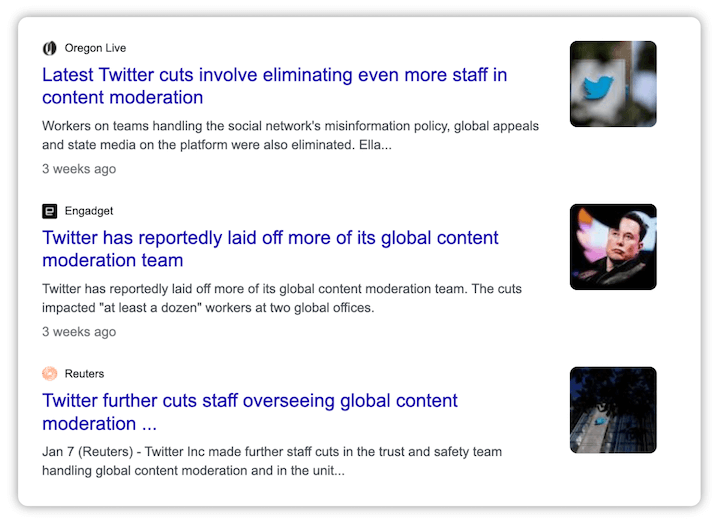
While I hope that companies continue to reinvest in their values, even things ensuring advertisers only pay for quality traffic and filter out invalid traffic are troubling. When no one is watching, are these tech companies going to improve or maintain their standards, or are they going to be tempted to water down that wine and charge advertisers for more traffic to influence their bottom line?”
So what’s the verdict?
If you haven’t been quite sure about how what’s going on with all of these Big Tech layoffs, my hope is that this article has demystified some of that for you. And as far as how you should be feeling, I’d say that a little concern is good, but panic? Not necessary. The experts and veterans in the industry aren’t taking any drastic measures. The idea is, as Ashton Clarke Tweeted to “help clients keep a level head and maintain stability.”
So long as you stay on top of the storyline, keep an eye on your metrics, and make PPC decisions based on data, not automated recommendations, your account and performance will stay in good shape!
The post What Do the Big Tech Layoffs Mean for Small Businesses & PPC? 8 Key Takeaways appeared first on WordStream.
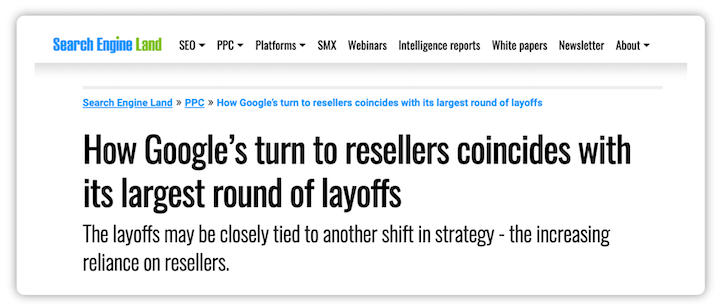


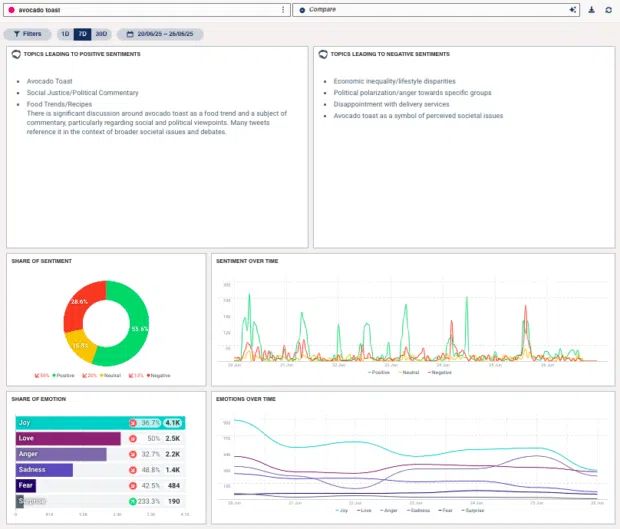

Recent Comments